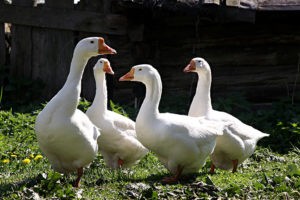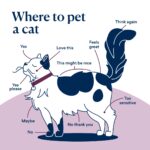Geese can be pets, offering unique companionship and benefits if you’re prepared for their specific needs. This comprehensive guide from PETS.EDU.VN will help you understand everything about keeping geese as pets, including choosing the right breed, providing proper housing, ensuring their health, and managing their behavior. Discover valuable insights and expert advice to create a thriving environment for your feathered friends, covering crucial aspects like goose breeds, waterfowl diets, and essential avian veterinary care for a successful and fulfilling pet ownership experience.
1. Understanding the Appeal of Geese as Pets
Geese are increasingly becoming popular pets, valued for their unique personalities and potential benefits. According to a study by the University of California, Davis, geese exhibit complex social behaviors and can form strong bonds with their owners, making them more than just ornamental additions to a backyard. Their growing popularity highlights the need for detailed information on proper care and management, addressing common questions about their suitability as pets.
1.1. What Makes Geese Unique Pets?
Geese offer several distinctive attributes:
- Natural Guardians: Geese are naturally territorial and vigilant, often alerting their owners to the presence of strangers or potential threats.
- Low-Maintenance Grazers: Their primary diet consists of grass, reducing the need for expensive commercial feed.
- Long Lifespan: Geese can live for 10-15 years or longer, providing long-term companionship.
- Egg Production: Female geese can lay a substantial number of eggs each year, which can be used for consumption or other purposes.
1.2. Addressing Common Misconceptions
It’s important to dispel common myths about geese. While wild geese can be aggressive, especially during breeding season, domestic geese raised in a nurturing environment are often docile and friendly. Regular, positive interaction from a young age can help foster a tame and affectionate pet.
2. Is Owning a Goose Right for You? Key Considerations
Before you decide to bring geese into your home, consider the following factors to ensure you can provide a suitable environment for these remarkable birds:
2.1. Space Requirements
Geese require ample space to roam and graze. According to guidelines from the Royal Society for the Prevention of Cruelty to Animals (RSPCA), each goose needs at least one square meter of indoor space for nighttime housing and two square meters of outdoor space. A pen measuring 20×40 feet is generally sufficient for three geese.
2.2. Legal and Community Regulations
Check local ordinances and homeowner association rules regarding backyard poultry. Many municipalities have specific regulations about the number of birds allowed and the conditions under which they must be kept. Failure to comply can result in fines or the need to rehome your geese.
2.3. Financial Implications
The cost of owning geese includes:
| Expense | Description | Estimated Cost |
|---|---|---|
| Initial Purchase | Cost of buying goslings or adult geese | $20-$100 per bird |
| Housing | Materials for building or modifying a suitable coop and outdoor enclosure | $200-$1000 |
| Feed | Supplemental feed, especially during winter months | $10-$30 per month |
| Veterinary Care | Routine check-ups and emergency treatments | $50-$200 per visit |
| Fencing and Maintenance | Costs for maintaining fences, pools, and general upkeep | $50-$100 per year |
2.4. Ethical Considerations
Responsible pet ownership involves providing proper care and attention. Geese are social animals and thrive when kept in pairs or small flocks. Ensure you are prepared to meet their physical and emotional needs, committing to their well-being for the duration of their lifespan.
3. Selecting the Right Goose Breed for Your Lifestyle
Choosing the right breed is crucial for a successful pet ownership experience. Some breeds are known for their docile temperament and suitability for domestic environments. Dr. Sharman Hoppes from Texas A&M College of Veterinary Medicine & Biomedical Sciences recommends breeds such as the Toulouse, American Buff, and Pilgrim.
3.1. Popular Goose Breeds and Their Temperaments
| Breed | Size | Temperament | Egg Production | Special Features |
|---|---|---|---|---|
| Toulouse | Large | Docile, calm, and friendly | 20-40 eggs/year | Known for their impressive size and gentle nature |
| American Buff | Medium | Friendly, good foragers, and adaptable | 30-50 eggs/year | Prized for their beautiful buff-colored plumage |
| Pilgrim | Medium | Docile, calm, and friendly | 30-60 eggs/year | Auto-sexing breed, where males and females have different feather colors at birth |
| Embden | Large | Dignified, alert, and can be territorial | 25-35 eggs/year | Pure white plumage and upright posture |
| Chinese | Light | Noisy, active, and excellent weeders | 50-70 eggs/year | Known for their graceful appearance and high egg production |
| African | Large | Imposing, loud, and can be aggressive if not properly socialized | 20-40 eggs/year | Distinctive knob on their head and dewlap |
3.2. Understanding Breed-Specific Needs
Different breeds have varying needs. For instance, Toulouse geese require more space due to their large size, while Chinese geese are more active and need more opportunities to forage. Understanding these breed-specific needs will help you tailor your care to ensure their well-being.
4. Creating a Comfortable and Safe Habitat for Pet Geese
Proper housing is essential for the health and happiness of your pet geese. A well-designed habitat protects them from predators, harsh weather, and potential injuries.
4.1. Indoor Housing Requirements
- Space: Provide at least one square meter per bird inside the coop.
- Bedding: Use soft, dry bedding such as straw or wood shavings.
- Ventilation: Ensure good ventilation to prevent the buildup of ammonia from droppings.
- Security: The coop should be secure to protect against predators like foxes, raccoons, and dogs.
4.2. Outdoor Enclosure Specifications
- Space: Offer at least two square meters per bird in the outdoor enclosure.
- Fencing: Use sturdy fencing at least 4 feet high to keep geese in and predators out.
- Grass: Geese need access to grass for grazing, which makes up a significant portion of their diet.
- Water Source: Provide a pool, pond, or large tub for swimming and bathing.
4.3. Protecting Geese from Predators
Predator-proofing your geese’s habitat is critical. Reinforce fences with wire mesh, use motion-activated lights, and consider a livestock guardian dog to deter predators. Regularly inspect the enclosure for any signs of breaches or weaknesses.
5. Nutritional Needs: What Do Geese Eat?
Proper nutrition is vital for the health and longevity of pet geese. Their diet should primarily consist of grass, supplemented with commercial waterfowl feed and fresh vegetables.
5.1. The Importance of Grazing
Grass should make up about 70% of a goose’s diet. Ensure your geese have access to a large, grassy area where they can graze throughout the day. Rotate grazing areas to prevent overgrazing and parasite buildup.
5.2. Supplemental Feeding
Supplement their diet with commercial waterfowl feed, which is formulated to meet their specific nutritional needs. Choose a feed appropriate for their age and activity level. According to the Poultry Science Association, waterfowl feed should contain around 15-16% protein for growing goslings and 12-14% for adult geese.
5.3. Safe and Unsafe Foods
| Safe Foods | Unsafe Foods | Notes |
|---|---|---|
| Grass | Chocolate | Toxic to geese |
| Commercial feed | Avocado | Can be toxic in large quantities |
| Leafy greens | Processed foods | Lack essential nutrients and can cause health problems |
| Vegetables | Sugary treats | Can lead to obesity and related health issues |
| Fruits (in moderation) | Salty snacks | Can cause dehydration and kidney problems |
| Whole grains | Nightshade vegetables | Tomatoes, potatoes, eggplant, and peppers contain solanine, which can be harmful in large doses |
6. Health and Veterinary Care for Pet Geese
Maintaining the health of your geese involves regular check-ups, vaccinations, and prompt treatment of any illnesses or injuries.
6.1. Common Health Issues in Geese
- Parasites: Geese are susceptible to internal and external parasites, such as worms, lice, and mites. Regular deworming and parasite control are essential.
- Foot Problems: Geese housed on hard surfaces or without access to water can develop foot problems like bumblefoot.
- Avian Influenza: Geese can contract avian influenza, a highly contagious viral disease. Vaccination and biosecurity measures are crucial.
- Egg Binding: Female geese can experience egg binding, where an egg becomes stuck in the oviduct.
- Trauma: Injuries from predators, accidents, or aggressive interactions with other birds are common.
6.2. Preventative Care Strategies
- Regular Check-ups: Schedule routine veterinary check-ups to monitor their health and detect any potential problems early.
- Vaccinations: Consult with your veterinarian about necessary vaccinations, such as avian influenza.
- Parasite Control: Implement a regular deworming and parasite control program.
- Proper Nutrition: Ensure they receive a balanced diet to support their immune system.
- Clean Environment: Maintain a clean and sanitary environment to minimize the risk of disease.
6.3. Finding a Qualified Avian Veterinarian
It’s important to find a veterinarian experienced in avian care. Not all veterinarians are comfortable treating birds, so it’s crucial to locate one with the necessary expertise. A qualified avian vet can provide specialized care and advice tailored to your geese’s needs.
7. Understanding Goose Behavior and Training
Geese are intelligent and social animals with unique behaviors. Understanding their behavior and providing appropriate training can enhance your relationship and ensure their safety.
7.1. Common Goose Behaviors
- Vocalization: Geese are vocal birds and communicate through honks, hisses, and other sounds.
- Territoriality: They are naturally territorial and may become aggressive towards strangers or other animals.
- Foraging: Geese spend much of their day foraging for food, grazing on grass, and searching for insects.
- Social Interaction: They are social animals and thrive in the company of other geese.
7.2. Basic Training Techniques
- Positive Reinforcement: Use positive reinforcement techniques, such as treats and praise, to reward desired behaviors.
- Clicker Training: Clicker training can be effective for teaching geese basic commands.
- Socialization: Early socialization can help geese become more comfortable around people and other animals.
7.3. Managing Aggression
Aggression is a common concern, especially during breeding season. To manage aggression:
- Provide Space: Ensure they have enough space to avoid feeling crowded or threatened.
- Supervision: Supervise interactions with children and other animals.
- Distraction: Use distractions, such as toys or treats, to redirect their attention.
- Separate Aggressors: If necessary, separate aggressive geese from the rest of the flock.
8. Breeding and Raising Goslings
If you plan to breed geese, you’ll need to provide a suitable environment for nesting and raising goslings.
8.1. Creating a Nesting Environment
- Nest Boxes: Provide nest boxes or secluded areas with soft bedding for nesting.
- Privacy: Ensure nesting areas are private and protected from disturbances.
- Materials: Offer nesting materials, such as straw, hay, and feathers.
8.2. Caring for Goslings
- Warmth: Goslings need a warm environment, especially during the first few weeks of life. Use a heat lamp to maintain a temperature of 90-95°F.
- Nutrition: Feed goslings a specialized gosling starter feed, which is high in protein and essential nutrients.
- Water: Provide fresh, clean water in a shallow dish to prevent drowning.
- Supervision: Supervise goslings closely to protect them from predators and potential hazards.
8.3. Legal Considerations for Breeding
Check local regulations regarding breeding and selling geese. Some areas may require permits or have restrictions on the number of birds you can keep.
9. Geese and Children: Ensuring Safe Interactions
Geese can be wonderful pets, but it’s important to supervise interactions with children to ensure safety.
9.1. Teaching Children How to Interact with Geese
- Gentle Handling: Teach children how to handle geese gently and avoid sudden movements or loud noises.
- Respect Boundaries: Encourage children to respect the geese’s space and avoid chasing or cornering them.
- Supervision: Always supervise interactions between children and geese.
9.2. Preventing Goose Attacks
- Avoid Provocation: Teach children not to provoke geese or disturb their nests.
- Maintain Distance: Keep a safe distance from geese, especially during breeding season.
- Stay Calm: If a goose becomes aggressive, remain calm and slowly back away.
9.3. Educating Children About Goose Behavior
Educate children about goose behavior, such as warning signs of aggression, to help them understand how to interact safely with these animals.
10. The Benefits and Joys of Owning Geese
Owning geese can be a rewarding experience, offering unique benefits and joys.
10.1. Companionship and Emotional Support
Geese can provide companionship and emotional support. They are intelligent and social animals that can form strong bonds with their owners.
10.2. Natural Pest Control
Geese are excellent foragers and can help control pests in your garden. They eat insects, weeds, and other unwanted plants, reducing the need for chemical pesticides.
10.3. Sustainable Living
Geese can contribute to a sustainable lifestyle by providing eggs, meat, and feathers. They also help to recycle nutrients and reduce waste.
10.4. Entertainment and Education
Watching geese interact and observing their behaviors can be entertaining and educational. They offer a unique glimpse into the natural world.
FAQ: Common Questions About Geese as Pets
1. Are geese good pets for beginners?
Geese can be good pets for beginners if you are prepared to meet their specific needs, including providing ample space, proper housing, and regular care.
2. Do geese get lonely if kept alone?
Yes, geese are social animals and thrive in the company of other geese. It’s best to keep them in pairs or small flocks to prevent loneliness and behavioral issues.
3. How much does it cost to keep geese as pets?
The cost of owning geese includes expenses for housing, feed, veterinary care, and fencing. Initial costs can range from $200 to $1000, with ongoing monthly expenses of $50 to $200.
4. What do geese eat besides grass?
In addition to grass, geese can eat commercial waterfowl feed, leafy greens, vegetables, fruits (in moderation), and whole grains.
5. Are geese noisy pets?
Yes, geese are vocal birds and can be noisy, especially when alerting to new sounds or potential threats.
6. How long do geese typically live?
Geese can live for 10-15 years or longer with proper care.
7. Do geese need water to swim in?
Yes, geese need access to water for swimming and bathing. A pool, pond, or large tub is essential for their well-being.
8. Can geese be house-trained?
While geese cannot be fully house-trained like dogs or cats, you can train them to use a designated area for droppings to keep their living space cleaner.
9. Are geese aggressive towards humans?
Domestic geese raised in a nurturing environment are often docile and friendly. However, they can become aggressive if they feel threatened or during breeding season.
10. Do geese need vaccinations?
Consult with your veterinarian about necessary vaccinations, such as avian influenza, to protect your geese from common diseases.
Conclusion: Embrace the Unique Charm of Pet Geese
Keeping geese as pets can be a truly rewarding experience, offering companionship, natural pest control, and a connection to sustainable living. By understanding their specific needs and providing proper care, you can create a thriving environment for these intelligent and social birds. At PETS.EDU.VN, we are committed to providing you with the most reliable and comprehensive information to ensure a happy and healthy life for your feathered friends.
Ready to embark on the adventure of owning geese? Visit PETS.EDU.VN today to explore our in-depth guides, expert advice, and resources for all your pet care needs. Whether you’re looking for more information on goose breeds, waterfowl diets, or avian veterinary care, we’ve got you covered. Contact us at 789 Paw Lane, Petville, CA 91234, United States, or reach out via WhatsApp at +1 555-987-6543. Let pets.edu.vn be your trusted partner in providing the best possible care for your beloved geese.
 Domestic Geese Grazing
Domestic Geese Grazing
A happy flock of domestic geese grazing on lush green grass, exemplifying their natural foraging behavior and highlighting the importance of providing a suitable grazing environment for their well-being, as discussed on PETS.EDU.VN.

